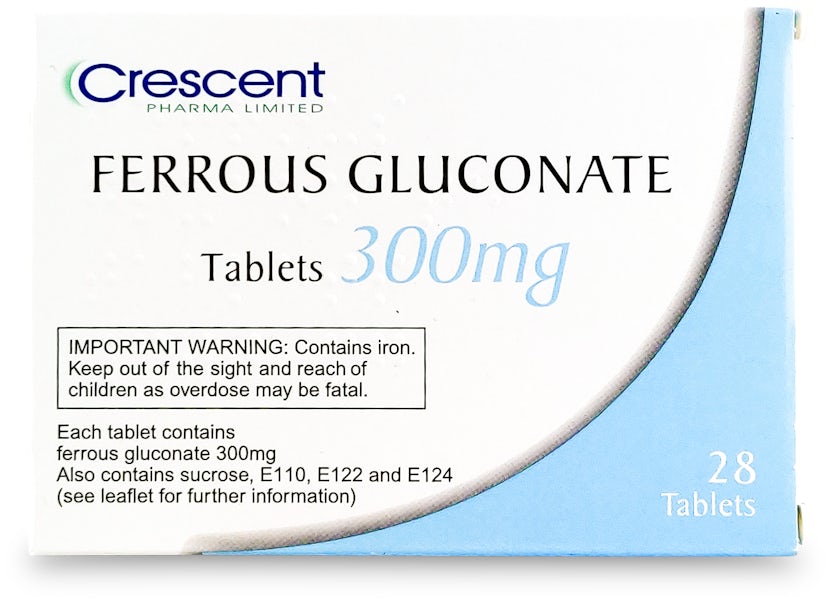Crescent Ferrous Gluconate 300mg Iron 28 Tablets
Crescent Ferrous Gluconate 300mg Iron 28 Tablets
What 500,000+ customers say about medino:
Get notified when back in stock
Description
Ferrous Gluconate Tablets contain ferrous gluconate 300mg as the active ingredient which is an iron supplement.
This medicine is used to prevent or treat anaemia due to a lack of iron caused by a number of conditions, including pregnancy. It is also used to treat anaemia caused when there is not enough iron in the diet or when the iron in the diet is poorly absorbed.
Therapeutic indications for Ferrous Gluconate Tablets:
- Prophylaxis of iron deficiency anaemia in pregnancy
- Menorrhagia following subtotal or total gastrectomy.
- Treatment of iron deficiency anaemia due to severe or chronic haemorrhage, nutritional deficiency, pregnancy, parasitic infestation and malabsorption of iron from the diet.
Ingredients
Each tablet contains 300mg of Ferrous Gluconate
Other ingredients: sucrose, E110, E122, E124 (see leaflet for full list)
Usage and Instructions
Adults:
Prevention:
Two tablets daily
Treatment(only under medical advice):
Four to six tablets daily in divided doses
Warnings
Before starting treatment it is important to exclude any underlying causes of anaemia, e.g. gastric erosions or colonic carcinoma.
Contraindicated if:
Hypersensitivity to iron preparations or to any of the excipients.
Iron preparations are contraindicated in patients with haemochromatosis, haemosiderosis or haemoglobinuria.
Iron salts should not be given to patients receiving repeated blood transfusions or parenteral iron therapy or to patients with anaemias not produced by iron deficiency (some conditions, such as thalassemia may cause excess storage of iron).
Alcoholism and hepatitis.
Iron preparations are contraindicated in active peptic ulcer, regional enteritis and ulcerative colitis.
Large doses may have irritant/corrosive effect on gastro-intestinal mucosa which can lead to necrosis and perforation. Ferrous gluconate should be used with caution in patients with haemolytic anaemia.
Care should be exercised in patients with iron-absorption diseases, existing gastro-intestinal disease, intestinal strictures and diverticulae.
Caution is required in the elderly, who may be at risk of serious adverse reactions.
This product contains sucrose. Patients with rare hereditary problems of fructose intolerance, glucose-galactose malabsorption or sucrose-isomaltase insufficiency should not take this medicine.
Interactions with food or medicines:
Concurrent use with iron, of antacids containing calcium salts, carbonates or magnesium trisilicate, and other medications containing bicarbonates, carbonates, oxalates or phosphates will decrease iron absorption because of the formation of less soluble or insoluble complexes; iron supplements should not be used within 1 hour before or 2 hours after ingestion of any of these preparations.
The absorption of iron is also slowed down by the concurrent intake of coffee, eggs, milk and milk products, tea (contains tannic acid) and whole grain breads and cereals (contain phytic acid).
Concurrent use of Vitamin E may impair the hematologic response in patients with iron deficiency anaemia. Large doses of iron may increase daily requirements of Vitamin E.
Iron salts may reduce the absorption of aluminium and zinc salts and the absorption of iron is also reduced with concurrent administration with zinc salts.
Proton pump inhibitors may reduce absorption of oral iron.
Iron also reduces the absorption of levothyroxine, a period of 2 hours should elapse between administration of levothyroxine and iron.
Pregnancy and breastfeeding:
There is no evidence of any harmful effects due to normal doses of Ferrous gluconate in pregnant women and nursing mothers, but as with all drugs care should be exercised in administering this preparation during pregnancy and lactation. Iron is excreted in breast milk but not in significant amounts (about 0.5mg/day).
Side Effects
Large doses of iron may cause gastro-intestinal discomfort, anorexia, diarrhoea, nausea, heartburn and vomiting.
These side effects have been reported to occur in up to 20% or more of patients treated and are related to the amount of elemental iron taken rather than the type of preparation.
Continued administration of Ferrous gluconate may result in constipation and fecal impaction.
Darkening of stools may occur. Higher doses of Ferrous gluconate may have irritant and corrosive effects on the gastrointestinal mucosa and necrosis and perforation may occur; stricture formation may subsequently follow.






